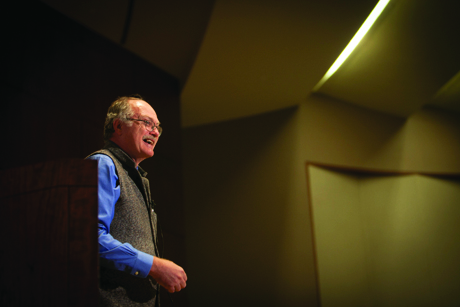Poverty leads to insight, says Oxfam VP
By Jacques Diec

From West Sumatra to Hanoi, John Ambler, Ph.D. ’87, vice president of strategy for Oxfam America, has devoted himself to public service in developing countries. “It’s perhaps the best job in the world,” he said in his April 24 Kaplan Family Distinguished Lecture, “Learning to Confront Poverty and Injustice, 10 Personal Lessons.”
Ambler’s contributions to Oxfam, an international confederation of 17 organizations working in about 90 countries to find solutions to poverty and social injustices, include development of its agricultural program, fundraising, and identifying best practices and strategic investments for its rights-based programming.
Ambler’s journey of global humanitarianism began with his service in Indonesia, inspired by a color leaflet he discovered while walking on campus as a Stanford University undergraduate.
“It talked about a program called Volunteers in Asia,” Ambler recalled, joking, “It might have even been turned down, facedown, I’m not sure. [But] it makes a better story.”
Nevertheless, it inspired him, and after learning Indonesian for two years, he worked in an impoverished village in West Sumatra, where he taught English.
Adjusting to life in a developing country was challenging.
“The food was really spicy, the temperature was abominably hot, the humidity was over 100 percent; it was completely different than anything I’ve been used to,” he recalled.
Moreover, he had to earn respect in the heavily matrilineal society. “Young, unmarried, unaccomplished males, including foreign ones, [were] the lowest species on the totem pole,” he said.
But “I did learn something about etiquette, patience, Islam and poverty during that period,” he noted. Nine years later he returned for his doctoral field work in water management.
“My stipend was $2 a day for volunteering in Asia and after I paid room and board, I had $25 a month to live on,” Ambler said. “... It started to put me into contact with issues of poverty and it taught me a little about how close to the edge a lot of people live.”
As regional director for Asia at CARE USA, Ambler worked in India, Vietnam, Thailand, Nepal and Sri Lanka. His experiences prepared him to work with such organizations as the Asian Development Bank, the United States Agency for International Development and the World Bank.
He noted a persistent problem in these organizations. “A lot of these people, they’re really smart, but they have never lived in a village so they don’t have any sense of the rhythms, of the rights, the negotiations, the things of everyday life ... in the village,” he said.
“Knowing a little bit about the culture, getting into the idioms, getting into the phrases, the sayings, the cultural expressions ... opens many doors – and besides hearing the same groans coming out of people when you make a bad pun, it makes us realize that we’re all the same,” he said.
Ambler also noted Cornell’s role in increasing awareness through its diverse combinations of disciplines. As a graduate student, he studied development sociology, agriculture and East Asian studies. “Where else except for Cornell can you get that concentration? You can’t just find that combination anywhere,” he said.
Finally, Ambler advised the campus community to continue to “feed on [the] passion and idealism” of peers: “All of us should continue to infect each other with the drive for pursuing what is right.”
Jacques Diec ’15 is a writer intern at the Cornell Chronicle.
Media Contact
Get Cornell news delivered right to your inbox.
Subscribe